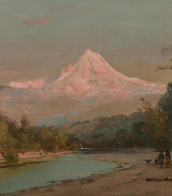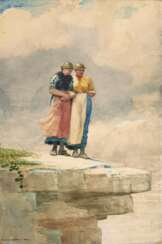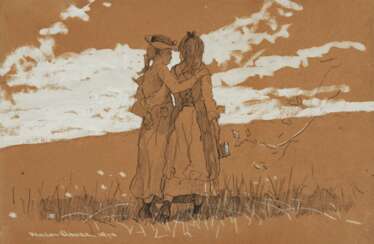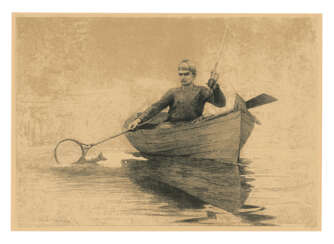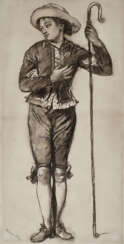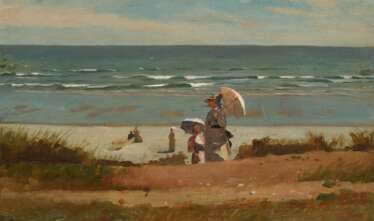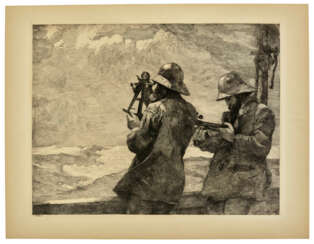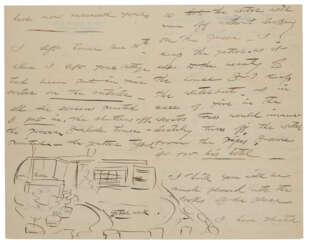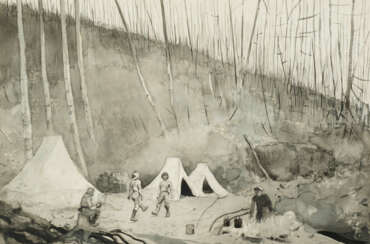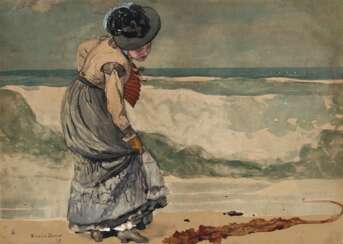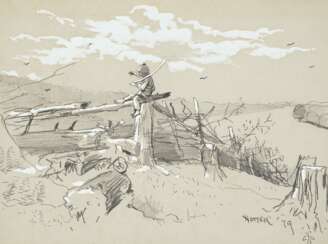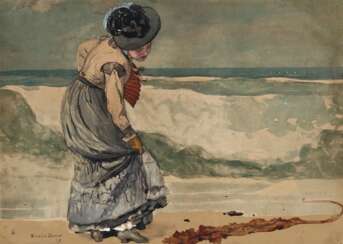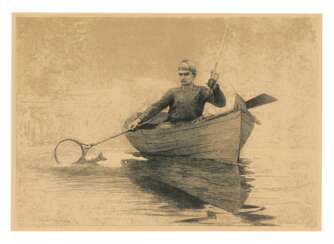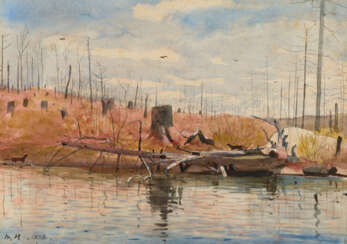Winslow Homer (1836 - 1910) — Auction price
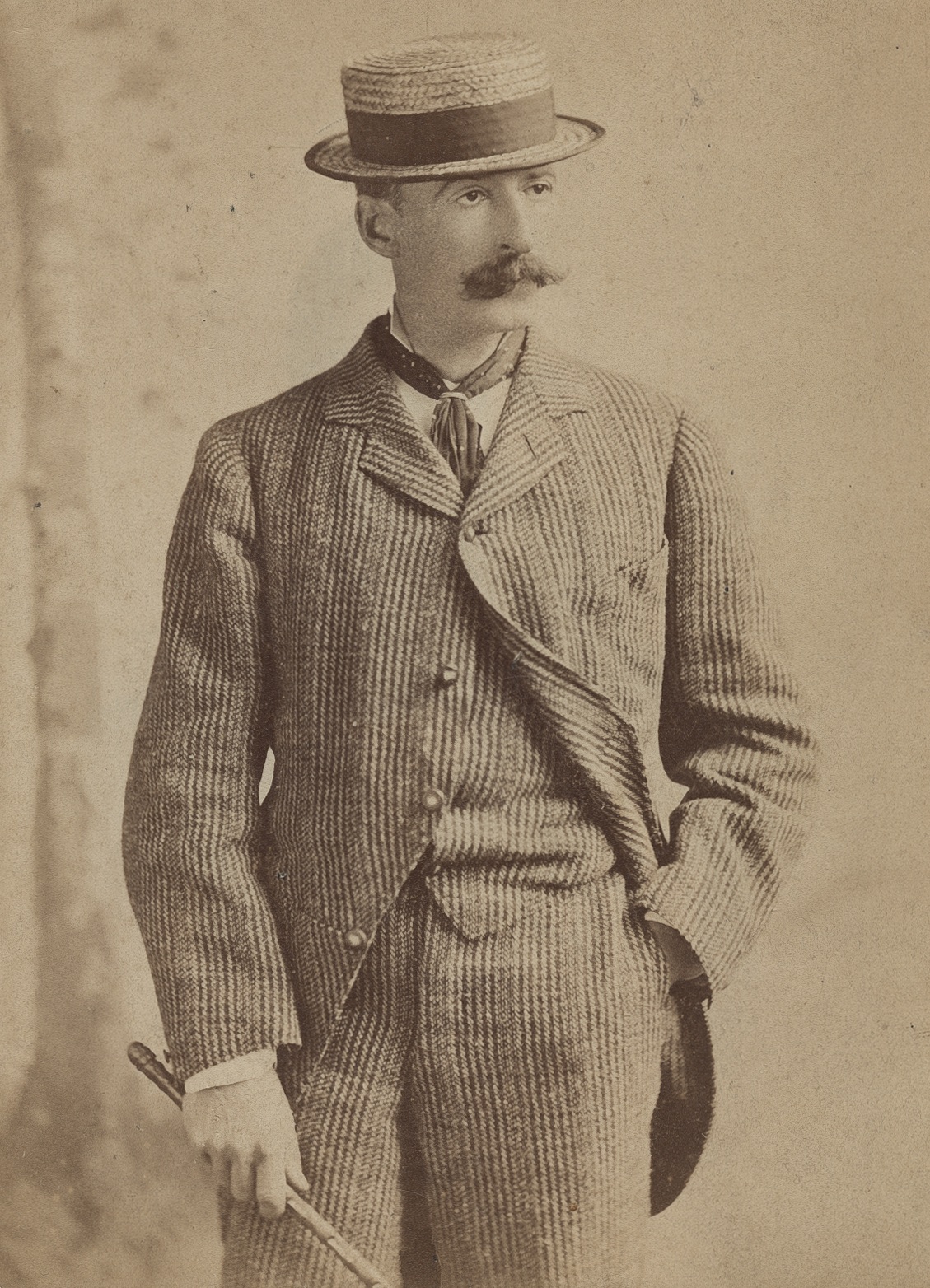
Winslow Homer was an American landscape painter and printmaker, renowned for his mastery of marine subjects and considered a preeminent figure in 19th-century American art. Born in Boston, Massachusetts in 1836, Homer was largely self-taught, starting his career as a commercial illustrator before venturing into oil painting and watercolors.
Homer's art evolved significantly over his lifetime. During the American Civil War, he worked as a correspondent, creating sketches that conveyed both the immediacy and the human cost of the war. This experience deeply influenced his later work, particularly his powerful oil paintings depicting war and its aftermath. After the war, Homer's focus shifted towards scenes of nature and rural America, reflecting a national nostalgia for simpler times. His works from this period, such as "The Cotton Pickers" and "Snap the Whip," showcase his ability to capture everyday life with poignant realism and emotional depth.
Later in his career, Homer became renowned for his watercolors and seascapes, such as "Breezing Up (A Fair Wind)" and "The Gulf Stream," which are celebrated for their dynamic composition and vivid portrayal of human interaction with nature. His late seascapes, which often depicted the rugged coastlines of Maine, are particularly noted for their dramatic intensity and hint at modernist abstraction, capturing the formidable power and timeless beauty of the sea.
Homer's works are held in high regard and continue to be featured in major museums and galleries, providing inspiration and insight into the American experience of the 19th century.
For those interested in the works of Winslow Homer and the impact of his art, you can sign up for updates related to new product sales and auction events featuring his work. This will keep you informed on opportunities to engage more deeply with Homer's enduring legacy.
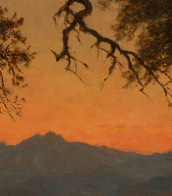

Winslow Homer was an American landscape painter and printmaker, renowned for his mastery of marine subjects and considered a preeminent figure in 19th-century American art. Born in Boston, Massachusetts in 1836, Homer was largely self-taught, starting his career as a commercial illustrator before venturing into oil painting and watercolors.
Homer's art evolved significantly over his lifetime. During the American Civil War, he worked as a correspondent, creating sketches that conveyed both the immediacy and the human cost of the war. This experience deeply influenced his later work, particularly his powerful oil paintings depicting war and its aftermath. After the war, Homer's focus shifted towards scenes of nature and rural America, reflecting a national nostalgia for simpler times. His works from this period, such as "The Cotton Pickers" and "Snap the Whip," showcase his ability to capture everyday life with poignant realism and emotional depth.
Later in his career, Homer became renowned for his watercolors and seascapes, such as "Breezing Up (A Fair Wind)" and "The Gulf Stream," which are celebrated for their dynamic composition and vivid portrayal of human interaction with nature. His late seascapes, which often depicted the rugged coastlines of Maine, are particularly noted for their dramatic intensity and hint at modernist abstraction, capturing the formidable power and timeless beauty of the sea.
Homer's works are held in high regard and continue to be featured in major museums and galleries, providing inspiration and insight into the American experience of the 19th century.
For those interested in the works of Winslow Homer and the impact of his art, you can sign up for updates related to new product sales and auction events featuring his work. This will keep you informed on opportunities to engage more deeply with Homer's enduring legacy.


Winslow Homer was an American landscape painter and printmaker, renowned for his mastery of marine subjects and considered a preeminent figure in 19th-century American art. Born in Boston, Massachusetts in 1836, Homer was largely self-taught, starting his career as a commercial illustrator before venturing into oil painting and watercolors.
Homer's art evolved significantly over his lifetime. During the American Civil War, he worked as a correspondent, creating sketches that conveyed both the immediacy and the human cost of the war. This experience deeply influenced his later work, particularly his powerful oil paintings depicting war and its aftermath. After the war, Homer's focus shifted towards scenes of nature and rural America, reflecting a national nostalgia for simpler times. His works from this period, such as "The Cotton Pickers" and "Snap the Whip," showcase his ability to capture everyday life with poignant realism and emotional depth.
Later in his career, Homer became renowned for his watercolors and seascapes, such as "Breezing Up (A Fair Wind)" and "The Gulf Stream," which are celebrated for their dynamic composition and vivid portrayal of human interaction with nature. His late seascapes, which often depicted the rugged coastlines of Maine, are particularly noted for their dramatic intensity and hint at modernist abstraction, capturing the formidable power and timeless beauty of the sea.
Homer's works are held in high regard and continue to be featured in major museums and galleries, providing inspiration and insight into the American experience of the 19th century.
For those interested in the works of Winslow Homer and the impact of his art, you can sign up for updates related to new product sales and auction events featuring his work. This will keep you informed on opportunities to engage more deeply with Homer's enduring legacy.
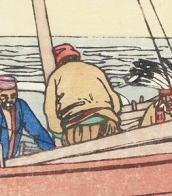

Winslow Homer was an American landscape painter and printmaker, renowned for his mastery of marine subjects and considered a preeminent figure in 19th-century American art. Born in Boston, Massachusetts in 1836, Homer was largely self-taught, starting his career as a commercial illustrator before venturing into oil painting and watercolors.
Homer's art evolved significantly over his lifetime. During the American Civil War, he worked as a correspondent, creating sketches that conveyed both the immediacy and the human cost of the war. This experience deeply influenced his later work, particularly his powerful oil paintings depicting war and its aftermath. After the war, Homer's focus shifted towards scenes of nature and rural America, reflecting a national nostalgia for simpler times. His works from this period, such as "The Cotton Pickers" and "Snap the Whip," showcase his ability to capture everyday life with poignant realism and emotional depth.
Later in his career, Homer became renowned for his watercolors and seascapes, such as "Breezing Up (A Fair Wind)" and "The Gulf Stream," which are celebrated for their dynamic composition and vivid portrayal of human interaction with nature. His late seascapes, which often depicted the rugged coastlines of Maine, are particularly noted for their dramatic intensity and hint at modernist abstraction, capturing the formidable power and timeless beauty of the sea.
Homer's works are held in high regard and continue to be featured in major museums and galleries, providing inspiration and insight into the American experience of the 19th century.
For those interested in the works of Winslow Homer and the impact of his art, you can sign up for updates related to new product sales and auction events featuring his work. This will keep you informed on opportunities to engage more deeply with Homer's enduring legacy.
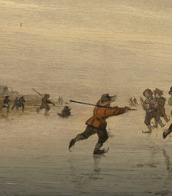

Winslow Homer was an American landscape painter and printmaker, renowned for his mastery of marine subjects and considered a preeminent figure in 19th-century American art. Born in Boston, Massachusetts in 1836, Homer was largely self-taught, starting his career as a commercial illustrator before venturing into oil painting and watercolors.
Homer's art evolved significantly over his lifetime. During the American Civil War, he worked as a correspondent, creating sketches that conveyed both the immediacy and the human cost of the war. This experience deeply influenced his later work, particularly his powerful oil paintings depicting war and its aftermath. After the war, Homer's focus shifted towards scenes of nature and rural America, reflecting a national nostalgia for simpler times. His works from this period, such as "The Cotton Pickers" and "Snap the Whip," showcase his ability to capture everyday life with poignant realism and emotional depth.
Later in his career, Homer became renowned for his watercolors and seascapes, such as "Breezing Up (A Fair Wind)" and "The Gulf Stream," which are celebrated for their dynamic composition and vivid portrayal of human interaction with nature. His late seascapes, which often depicted the rugged coastlines of Maine, are particularly noted for their dramatic intensity and hint at modernist abstraction, capturing the formidable power and timeless beauty of the sea.
Homer's works are held in high regard and continue to be featured in major museums and galleries, providing inspiration and insight into the American experience of the 19th century.
For those interested in the works of Winslow Homer and the impact of his art, you can sign up for updates related to new product sales and auction events featuring his work. This will keep you informed on opportunities to engage more deeply with Homer's enduring legacy.
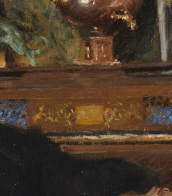

Winslow Homer was an American landscape painter and printmaker, renowned for his mastery of marine subjects and considered a preeminent figure in 19th-century American art. Born in Boston, Massachusetts in 1836, Homer was largely self-taught, starting his career as a commercial illustrator before venturing into oil painting and watercolors.
Homer's art evolved significantly over his lifetime. During the American Civil War, he worked as a correspondent, creating sketches that conveyed both the immediacy and the human cost of the war. This experience deeply influenced his later work, particularly his powerful oil paintings depicting war and its aftermath. After the war, Homer's focus shifted towards scenes of nature and rural America, reflecting a national nostalgia for simpler times. His works from this period, such as "The Cotton Pickers" and "Snap the Whip," showcase his ability to capture everyday life with poignant realism and emotional depth.
Later in his career, Homer became renowned for his watercolors and seascapes, such as "Breezing Up (A Fair Wind)" and "The Gulf Stream," which are celebrated for their dynamic composition and vivid portrayal of human interaction with nature. His late seascapes, which often depicted the rugged coastlines of Maine, are particularly noted for their dramatic intensity and hint at modernist abstraction, capturing the formidable power and timeless beauty of the sea.
Homer's works are held in high regard and continue to be featured in major museums and galleries, providing inspiration and insight into the American experience of the 19th century.
For those interested in the works of Winslow Homer and the impact of his art, you can sign up for updates related to new product sales and auction events featuring his work. This will keep you informed on opportunities to engage more deeply with Homer's enduring legacy.
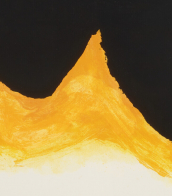

Winslow Homer was an American landscape painter and printmaker, renowned for his mastery of marine subjects and considered a preeminent figure in 19th-century American art. Born in Boston, Massachusetts in 1836, Homer was largely self-taught, starting his career as a commercial illustrator before venturing into oil painting and watercolors.
Homer's art evolved significantly over his lifetime. During the American Civil War, he worked as a correspondent, creating sketches that conveyed both the immediacy and the human cost of the war. This experience deeply influenced his later work, particularly his powerful oil paintings depicting war and its aftermath. After the war, Homer's focus shifted towards scenes of nature and rural America, reflecting a national nostalgia for simpler times. His works from this period, such as "The Cotton Pickers" and "Snap the Whip," showcase his ability to capture everyday life with poignant realism and emotional depth.
Later in his career, Homer became renowned for his watercolors and seascapes, such as "Breezing Up (A Fair Wind)" and "The Gulf Stream," which are celebrated for their dynamic composition and vivid portrayal of human interaction with nature. His late seascapes, which often depicted the rugged coastlines of Maine, are particularly noted for their dramatic intensity and hint at modernist abstraction, capturing the formidable power and timeless beauty of the sea.
Homer's works are held in high regard and continue to be featured in major museums and galleries, providing inspiration and insight into the American experience of the 19th century.
For those interested in the works of Winslow Homer and the impact of his art, you can sign up for updates related to new product sales and auction events featuring his work. This will keep you informed on opportunities to engage more deeply with Homer's enduring legacy.
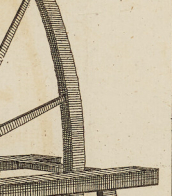

Winslow Homer was an American landscape painter and printmaker, renowned for his mastery of marine subjects and considered a preeminent figure in 19th-century American art. Born in Boston, Massachusetts in 1836, Homer was largely self-taught, starting his career as a commercial illustrator before venturing into oil painting and watercolors.
Homer's art evolved significantly over his lifetime. During the American Civil War, he worked as a correspondent, creating sketches that conveyed both the immediacy and the human cost of the war. This experience deeply influenced his later work, particularly his powerful oil paintings depicting war and its aftermath. After the war, Homer's focus shifted towards scenes of nature and rural America, reflecting a national nostalgia for simpler times. His works from this period, such as "The Cotton Pickers" and "Snap the Whip," showcase his ability to capture everyday life with poignant realism and emotional depth.
Later in his career, Homer became renowned for his watercolors and seascapes, such as "Breezing Up (A Fair Wind)" and "The Gulf Stream," which are celebrated for their dynamic composition and vivid portrayal of human interaction with nature. His late seascapes, which often depicted the rugged coastlines of Maine, are particularly noted for their dramatic intensity and hint at modernist abstraction, capturing the formidable power and timeless beauty of the sea.
Homer's works are held in high regard and continue to be featured in major museums and galleries, providing inspiration and insight into the American experience of the 19th century.
For those interested in the works of Winslow Homer and the impact of his art, you can sign up for updates related to new product sales and auction events featuring his work. This will keep you informed on opportunities to engage more deeply with Homer's enduring legacy.
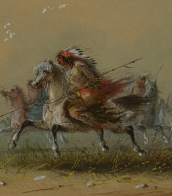

Winslow Homer was an American landscape painter and printmaker, renowned for his mastery of marine subjects and considered a preeminent figure in 19th-century American art. Born in Boston, Massachusetts in 1836, Homer was largely self-taught, starting his career as a commercial illustrator before venturing into oil painting and watercolors.
Homer's art evolved significantly over his lifetime. During the American Civil War, he worked as a correspondent, creating sketches that conveyed both the immediacy and the human cost of the war. This experience deeply influenced his later work, particularly his powerful oil paintings depicting war and its aftermath. After the war, Homer's focus shifted towards scenes of nature and rural America, reflecting a national nostalgia for simpler times. His works from this period, such as "The Cotton Pickers" and "Snap the Whip," showcase his ability to capture everyday life with poignant realism and emotional depth.
Later in his career, Homer became renowned for his watercolors and seascapes, such as "Breezing Up (A Fair Wind)" and "The Gulf Stream," which are celebrated for their dynamic composition and vivid portrayal of human interaction with nature. His late seascapes, which often depicted the rugged coastlines of Maine, are particularly noted for their dramatic intensity and hint at modernist abstraction, capturing the formidable power and timeless beauty of the sea.
Homer's works are held in high regard and continue to be featured in major museums and galleries, providing inspiration and insight into the American experience of the 19th century.
For those interested in the works of Winslow Homer and the impact of his art, you can sign up for updates related to new product sales and auction events featuring his work. This will keep you informed on opportunities to engage more deeply with Homer's enduring legacy.
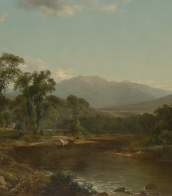

Winslow Homer was an American landscape painter and printmaker, renowned for his mastery of marine subjects and considered a preeminent figure in 19th-century American art. Born in Boston, Massachusetts in 1836, Homer was largely self-taught, starting his career as a commercial illustrator before venturing into oil painting and watercolors.
Homer's art evolved significantly over his lifetime. During the American Civil War, he worked as a correspondent, creating sketches that conveyed both the immediacy and the human cost of the war. This experience deeply influenced his later work, particularly his powerful oil paintings depicting war and its aftermath. After the war, Homer's focus shifted towards scenes of nature and rural America, reflecting a national nostalgia for simpler times. His works from this period, such as "The Cotton Pickers" and "Snap the Whip," showcase his ability to capture everyday life with poignant realism and emotional depth.
Later in his career, Homer became renowned for his watercolors and seascapes, such as "Breezing Up (A Fair Wind)" and "The Gulf Stream," which are celebrated for their dynamic composition and vivid portrayal of human interaction with nature. His late seascapes, which often depicted the rugged coastlines of Maine, are particularly noted for their dramatic intensity and hint at modernist abstraction, capturing the formidable power and timeless beauty of the sea.
Homer's works are held in high regard and continue to be featured in major museums and galleries, providing inspiration and insight into the American experience of the 19th century.
For those interested in the works of Winslow Homer and the impact of his art, you can sign up for updates related to new product sales and auction events featuring his work. This will keep you informed on opportunities to engage more deeply with Homer's enduring legacy.


Winslow Homer was an American landscape painter and printmaker, renowned for his mastery of marine subjects and considered a preeminent figure in 19th-century American art. Born in Boston, Massachusetts in 1836, Homer was largely self-taught, starting his career as a commercial illustrator before venturing into oil painting and watercolors.
Homer's art evolved significantly over his lifetime. During the American Civil War, he worked as a correspondent, creating sketches that conveyed both the immediacy and the human cost of the war. This experience deeply influenced his later work, particularly his powerful oil paintings depicting war and its aftermath. After the war, Homer's focus shifted towards scenes of nature and rural America, reflecting a national nostalgia for simpler times. His works from this period, such as "The Cotton Pickers" and "Snap the Whip," showcase his ability to capture everyday life with poignant realism and emotional depth.
Later in his career, Homer became renowned for his watercolors and seascapes, such as "Breezing Up (A Fair Wind)" and "The Gulf Stream," which are celebrated for their dynamic composition and vivid portrayal of human interaction with nature. His late seascapes, which often depicted the rugged coastlines of Maine, are particularly noted for their dramatic intensity and hint at modernist abstraction, capturing the formidable power and timeless beauty of the sea.
Homer's works are held in high regard and continue to be featured in major museums and galleries, providing inspiration and insight into the American experience of the 19th century.
For those interested in the works of Winslow Homer and the impact of his art, you can sign up for updates related to new product sales and auction events featuring his work. This will keep you informed on opportunities to engage more deeply with Homer's enduring legacy.
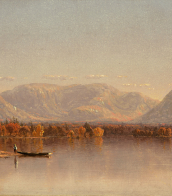

Winslow Homer was an American landscape painter and printmaker, renowned for his mastery of marine subjects and considered a preeminent figure in 19th-century American art. Born in Boston, Massachusetts in 1836, Homer was largely self-taught, starting his career as a commercial illustrator before venturing into oil painting and watercolors.
Homer's art evolved significantly over his lifetime. During the American Civil War, he worked as a correspondent, creating sketches that conveyed both the immediacy and the human cost of the war. This experience deeply influenced his later work, particularly his powerful oil paintings depicting war and its aftermath. After the war, Homer's focus shifted towards scenes of nature and rural America, reflecting a national nostalgia for simpler times. His works from this period, such as "The Cotton Pickers" and "Snap the Whip," showcase his ability to capture everyday life with poignant realism and emotional depth.
Later in his career, Homer became renowned for his watercolors and seascapes, such as "Breezing Up (A Fair Wind)" and "The Gulf Stream," which are celebrated for their dynamic composition and vivid portrayal of human interaction with nature. His late seascapes, which often depicted the rugged coastlines of Maine, are particularly noted for their dramatic intensity and hint at modernist abstraction, capturing the formidable power and timeless beauty of the sea.
Homer's works are held in high regard and continue to be featured in major museums and galleries, providing inspiration and insight into the American experience of the 19th century.
For those interested in the works of Winslow Homer and the impact of his art, you can sign up for updates related to new product sales and auction events featuring his work. This will keep you informed on opportunities to engage more deeply with Homer's enduring legacy.


Winslow Homer was an American landscape painter and printmaker, renowned for his mastery of marine subjects and considered a preeminent figure in 19th-century American art. Born in Boston, Massachusetts in 1836, Homer was largely self-taught, starting his career as a commercial illustrator before venturing into oil painting and watercolors.
Homer's art evolved significantly over his lifetime. During the American Civil War, he worked as a correspondent, creating sketches that conveyed both the immediacy and the human cost of the war. This experience deeply influenced his later work, particularly his powerful oil paintings depicting war and its aftermath. After the war, Homer's focus shifted towards scenes of nature and rural America, reflecting a national nostalgia for simpler times. His works from this period, such as "The Cotton Pickers" and "Snap the Whip," showcase his ability to capture everyday life with poignant realism and emotional depth.
Later in his career, Homer became renowned for his watercolors and seascapes, such as "Breezing Up (A Fair Wind)" and "The Gulf Stream," which are celebrated for their dynamic composition and vivid portrayal of human interaction with nature. His late seascapes, which often depicted the rugged coastlines of Maine, are particularly noted for their dramatic intensity and hint at modernist abstraction, capturing the formidable power and timeless beauty of the sea.
Homer's works are held in high regard and continue to be featured in major museums and galleries, providing inspiration and insight into the American experience of the 19th century.
For those interested in the works of Winslow Homer and the impact of his art, you can sign up for updates related to new product sales and auction events featuring his work. This will keep you informed on opportunities to engage more deeply with Homer's enduring legacy.


Winslow Homer was an American landscape painter and printmaker, renowned for his mastery of marine subjects and considered a preeminent figure in 19th-century American art. Born in Boston, Massachusetts in 1836, Homer was largely self-taught, starting his career as a commercial illustrator before venturing into oil painting and watercolors.
Homer's art evolved significantly over his lifetime. During the American Civil War, he worked as a correspondent, creating sketches that conveyed both the immediacy and the human cost of the war. This experience deeply influenced his later work, particularly his powerful oil paintings depicting war and its aftermath. After the war, Homer's focus shifted towards scenes of nature and rural America, reflecting a national nostalgia for simpler times. His works from this period, such as "The Cotton Pickers" and "Snap the Whip," showcase his ability to capture everyday life with poignant realism and emotional depth.
Later in his career, Homer became renowned for his watercolors and seascapes, such as "Breezing Up (A Fair Wind)" and "The Gulf Stream," which are celebrated for their dynamic composition and vivid portrayal of human interaction with nature. His late seascapes, which often depicted the rugged coastlines of Maine, are particularly noted for their dramatic intensity and hint at modernist abstraction, capturing the formidable power and timeless beauty of the sea.
Homer's works are held in high regard and continue to be featured in major museums and galleries, providing inspiration and insight into the American experience of the 19th century.
For those interested in the works of Winslow Homer and the impact of his art, you can sign up for updates related to new product sales and auction events featuring his work. This will keep you informed on opportunities to engage more deeply with Homer's enduring legacy.
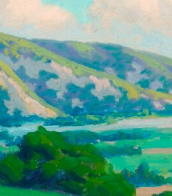

Winslow Homer was an American landscape painter and printmaker, renowned for his mastery of marine subjects and considered a preeminent figure in 19th-century American art. Born in Boston, Massachusetts in 1836, Homer was largely self-taught, starting his career as a commercial illustrator before venturing into oil painting and watercolors.
Homer's art evolved significantly over his lifetime. During the American Civil War, he worked as a correspondent, creating sketches that conveyed both the immediacy and the human cost of the war. This experience deeply influenced his later work, particularly his powerful oil paintings depicting war and its aftermath. After the war, Homer's focus shifted towards scenes of nature and rural America, reflecting a national nostalgia for simpler times. His works from this period, such as "The Cotton Pickers" and "Snap the Whip," showcase his ability to capture everyday life with poignant realism and emotional depth.
Later in his career, Homer became renowned for his watercolors and seascapes, such as "Breezing Up (A Fair Wind)" and "The Gulf Stream," which are celebrated for their dynamic composition and vivid portrayal of human interaction with nature. His late seascapes, which often depicted the rugged coastlines of Maine, are particularly noted for their dramatic intensity and hint at modernist abstraction, capturing the formidable power and timeless beauty of the sea.
Homer's works are held in high regard and continue to be featured in major museums and galleries, providing inspiration and insight into the American experience of the 19th century.
For those interested in the works of Winslow Homer and the impact of his art, you can sign up for updates related to new product sales and auction events featuring his work. This will keep you informed on opportunities to engage more deeply with Homer's enduring legacy.
